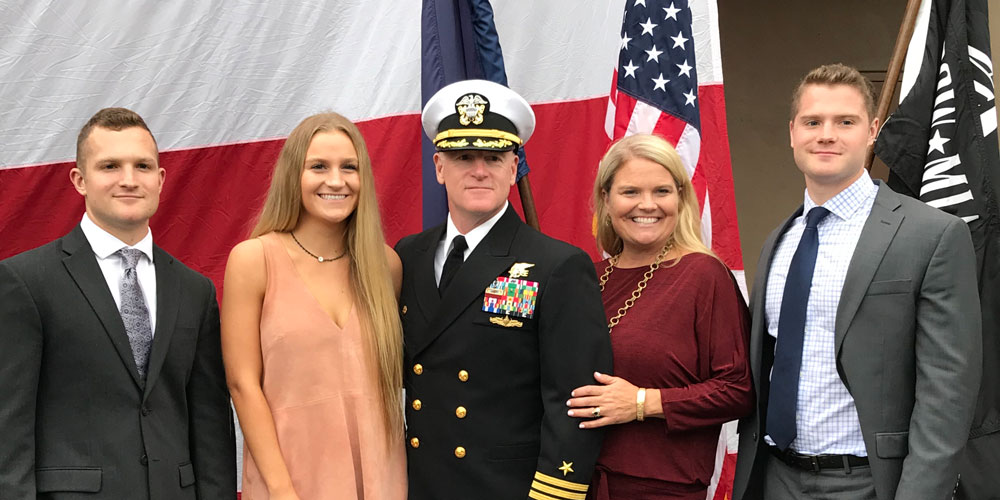Published: September 9, 2021

Lost Innocence: Reflecting on the 20th Anniversary of 9/11
Twenty years. It seems impossible that it’s been that long, but for the last 20 years, military families have been serving during a time of war. Long enough that military children, affected by a lifetime of deployments and forever changed by loss, are now serving themselves — children like Suzanne’s.
Suzanne is a proud Navy spouse whose three children have been raised in this unpredictable environment. As a family, they’ve gone through 11 deployments in addition to countless long-term separations for training exercises. What have those deployments and temporary assignments meant for them? For starters, many missed moments. “When asked what my husband has missed due to his service, I have to chuckle,” Suzanne said. “If you can think of it, he’s missed it! Graduations, confirmations, communions, weddings (almost our own!), funerals, and even military moves.” Still, Suzanne counts herself lucky and focuses on what her husband hasn’t missed. That list includes the birth of each child. While sometimes narrowly making it, he was there for each, which is something not all military families can say.
While Suzanne can laugh about the missed events, she vividly recalls one event that’s much more serious and changed the dynamic of her family forever — the loss of a dear friend and “uncle” to her children. “June 28th, 2005 is a date I’ll never forget,” Suzanne shared. “When Lieutenant Mike Murphy died, my children forever lost their innocence. Mike was the OIC [Officer in Charge] of our sister platoon. My kids knew Mike as ‘Uncle Mike.’ They were devastated by his death, their first close death in my husband’s community. But then came the realization that their dad did dangerous work. Before this, dad was just dad who had to ‘work’ a lot. After that loss, his work had a new, more lethal meaning to them. Without any time to adjust together as a family, to navigate these big new emotions, my husband’s deployment got pushed up and he left us for just shy of a year. That year was challenging in so many ways. Every time the doorbell rang, all of our hearts stopped for a minute. Our world, our simple, loving family life, was forever altered. The umbrella of innocence for my kids was gone forever.”
Since then, they’ve continued to face deployment after deployment. Suzanne has dealt with the fear and anxiety of losing communication—wondering, waiting, praying, pacing for what feels like a lifetime to receive word about his safety and whereabouts. She’s gone to funerals, for friends and teammates, all while her husband was forward deployed — an experience that Suzanne says is both surreal and a stress unlike any other. It’s living with experiences like those that makes it sting so much more to hear “you chose this life,” “you knew what you were signing up for,” or some variation of that from civilian neighbors. While, yes, service members have “signed up” for military life, that doesn’t mean they could ever completely understand what that service would mean or how it would impact their family. It also doesn’t negate or make the hardships any easier.
Unfortunately, the lack of understanding is a common problem that can be isolating for military families. In response to the 2020 Military Family Lifestyle Survey, 79% of active-duty military families feel the general public is largely unaware of the daily challenges they face. If military families don’t feel the civilian community truly understands the difficulties of military life, how could they truly feel supported or appreciated? And having that support can be so crucial. Because it’s not just the deployments that create challenges; it’s also the frequent moves and demanding work hours that impact families every single day.
“Our eldest son went to 12 schools in 12 years,” Suzanne recalled. “Starting over for not only school, but sports was really hard. Applying to college when you have gone to three different high schools was difficult. Not getting awards and accolades that you rightfully deserve at a school that does not know you hurts your resume for college. The wars in Iraq and Afghanistan, and this unpredictable military life, have made myself and my children resilient. But the resilience has come at a cost. I had to really impress upon my children empathy for others. Resilience can make you callous. There is a fine line between them.”
Suzanne’s efforts to prevent the callousness and to raise empathetic children seem to have paid off. Two of her children have chosen to serve, with endless personal sacrifices, to protect U.S. citizens and our allies around the globe. With the wars in Iraq and Afghanistan coming to an end, Suzanne focuses on the positive and can only hope that war won’t continue to define the service of her two sons and daughter-in-law, and the families they might build in the future.
It’s been a long fight for military and Veteran families for the past 20 years, and we’re still on duty. Military- and Veteran-connected families are in our communities, and they need our support. While Suzanne remains hopeful as she looks back on the last 20 years, we know the anniversary of 9/11 may bring back feelings of anxiety and stress for military families. If you or a family member is struggling to process those feelings, know you’re not alone and help is available. The Cohen Veterans Network, our Blue Star Partner, has resources available to help.
Are you a civilian neighbor eager to lend a hand as military families continue to navigate loss and other sacrifices from service? You can become a Blue Star Partner, too. By making a donation in support of Blue Star Families, you can support all military- and Veteran-connected families — helping them find resources, build connections, and create an environment in which they can thrive. To learn more about the programs and resources available and how to give, visit www.bluestarfam.org.
Posted In: Military Family Lifestyle Survey
